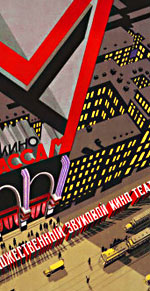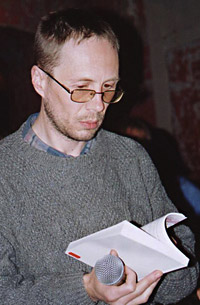
| Jacket 36 — Late 2008 | Jacket 36 Contents page | Jacket Homepage | Search Jacket |
This piece is about 9 printed pages long. It is copyright © Andrei Polyakov and Peter Golub and Jacket magazine 2008. See our [»»] Copyright notice. The Internet address of this page is http://jacketmagazine.com/36/rus-polyakov-trb-golub.shtml

Back to the Russian poetry Contents list
from America (’Round Midnight)
— for Boris Khersonsky
Nine
1.
How’s it going Boris!
Listen,
I think we’ll start another long poem
in this round of the night
with our plaintive lyrics
we’ll start into this snowy night —
we are astonished, another long poem is started!
Let us sing jazz!
You know, like it was before,
we’ll read words
into the morning
remember...
Into the window slightly ajar
in general
unimportant
slow smoke
breathing
tobacco honey...
(Simferopol winter in the window,
and in the street
snow and more snow...)
(the flat is turned into housing —
the air is luminous, makes itself at home...
breath the electric light
don’t breath
it won’t help...)
You see —
snow is in the street?
You see, look the light is all around the room?
You see or don’t you
the things in the room seem solid, right?
And me
I observe — things
watery, soft in the midnight,
woven with the smoke
(like sinking laurels),
making narrations...
not narrations, but nights?
no Boris —
speaking sleeping narrations,
the musical word:
these things —
like the rest
but the word —
like the word in a poem:
is just a word,
like when with my poems,
I regularly wrote poetry
(composed them very tenderly.)
We will for all things
we will we will Khersonsky Boris,
a multitude of tiny words
fitting
like handwriting in talented youth
to printed letters
changing
forgetting ourselves on the words,
with words we will
about the patrolling angel
remember nothing according to the secret
nothing according to the secret
(like people in space flight)
we won’t know
won’t be able to know
put on these words
like on the secret number nine
look with the snowy night —
flare with fighting eyes...
So here I am flaring my military eyes.
I’m on patrol, I look around.
Here. I write my poem, compose, type.
It will be huge —
this poem.
Let us begin the poem.
Boris.
I am beginning the poem.
Let us begin the poem.
I am beginning another enormous poem.
I’m simply enumerating the words. I call it, enumerating, things.
Here. I rearrange the words. Rearrange the things.
I listen to music
( — I wonder if the black diva
is singing at the military cemetery,
and the metaphysical copper
rings in the radio?..)
Is the diva singing
I listen, I said, to music.
Name, things, listen, to, music.
Words.
Words.
Here. Compose. Words. Poem.
The music is heard. The snow falls.
Evenly heard
snow-lightship.
Word.
Into the music I mix things with words.
Here. Enumerate things with words:
“Stone snow,
crisp pillows,
effulgence of eyes,
nine hairpins...”
It seems, we must,
enumerate with words
the number nine around.
We’ll enumerate everything!
The time of night —
not salt and not sugar —
our time is darker, it’s time,
our time has come, God knows,
our time has come
(our time)
our time, we’ll take
it with fear.
2.
Nine markings on the high stone snow.
And the open crispness of pillows.
The flare of fighting eyes.
Having dropped nine hairpins onto the table,
gold, yellow
turns wires and currents
of the maid’s curls.
He’d choose what he could,
only not down.
You and I choose
two hours, two weeks
of extinction.
The rotation’s diminution,
this —
the distances, the face of the apparition
amidst thin hand-sized
half-stars.
Wherever...
Wherever — up
but not down.
Well then —
he doesn’t recollect
the stone snow,
simply doesn’t know
of stone snow
catching fire.
From here come
all the fragile rocks
bitter for all darkness,
preserved for his —
numbness.
You
take your black and white keys:
play what’s in your head, what’s in your sleep
So it is night or it is snow —
choose!
Time is lengthy process, not at all contained:
murky, pale,
in no way living,
and the heaviness, God, of the snow...
And the heaviness of the snow —
are these stripes or stars?
Not stripes and stars, but after,
the stars after
the open window,
presto!
the noise
the breathing of train’s wheels,
a burst of wind under the wing or something more —
the reverse butterflies inside the sparks
speeding into dawn.
Should it stop
these miraculous circles?
Not possible...
Or send a boat along the autumn leaves?
Or place a windmill in the downpour?
It’s impossible, Boris!
No, not hunched over in an open coat
over the blackness of the piano,
not smoke or roll
not in the throat the apple
that looks like bebop,
and wake up not in the dark and with unlikely red winged lips,
not listen to a song half-heartedly
about a man asleep inside a guitar, and shallowly ch-ew-up the rain,
which runs over the speaker late at night,
and it’s impossible to illuminate the forest or the trees,
or the usual triumphal birds
a flag resembling
the bird,
if you see —
behind this flag,
if you touch it and see with your hand,
that behind this magnificent singer
reverse butterflies beat,
around the turning records:
in the center of the apple,
in the grove where the hair falls,
reading love, as a lachrymal radio,
Persephone, prepares a txt message,
fixes her hair
looking in the magazine...
But wait, who there has stiffened,
like an upright bass griffin —
he is tall,
begins to smoke and yell:
“Go out into the Ukraine night
and find me a copy of Down Beat!
How strange is the Crimea?
No old jazz spins here
nor have I ever seen a crowd
of young black hipsters.
I need America
or at least a show in Russia’s capitals
and find a fraction:
America —
the land of brides!
I don’t want a blond Marguerite,
or even a red Shulamith
I want a black woman
And a horn.”
3.
Listen — this — is — for — you
This is now prose for you
(in the thirst for tender profit
on the rows of snowy pastures).
You have no right on me
this — is not prose — for you!
Prose is, but this —
is the singing of a foreign God
in a house with an apple after the snow:
in this night (the night is!)
it is the prose
follows with
with glass light
snow from snow
behind the window
warm from the light
next to the plastic blue table
cloth —
in the eyes of the foreign
Black God.
This all might be a bit fulsome:
even if nothing happens,
the snow will play even louder
than in sleep.
Piano player
(I love you, Black Monk
and kissed your record
and the Crimean blond
under the open window
I held tight to my chest like a sick wife),
even if we lose each other
(like the cat train flying,
with rustling feet
that move along invisible rails),
in the blizzard —
let us drink to a private house and smoke —
he will say warmly over sweet tea
(the arrival of an honest house and smoke
accepts the warmth of the sweet tea)...
This is a horn in warmth and ash —
or snow upon reflecting glass?
This is you, this is —
tea on the table!
Is there really no name
for this
dark tea?
But nudged with an elbow
only night is the color of tea
there, where the God of drums resides in the head
where a young human being
physically blows into the horn
where the small coral lips
of my beloved,
where no one will be forgotten
on thin cardboard sleeves,
where, I am famous on words
although on more distant,
far off, like in the future, these words.
So that you might be changed by winged lips.
To once again believe in God,
and fall in love with the biblical
Word.
To cross oneself.
Disappear.
Into a still summer afternoon. And into a wintry
wintry night.
Note: America (’Round Midnight) is composed of nine parts; this is part one.

Andrei Polyakov
Andrei Polyakov(b. 1968 Crimea) holds a degree in philology from Tavrical National University. He was an editor with The Journal Review, a Crimean digest of Russian literature. His poems have appeared in Znamya, Vozdukh, and Novaya Yunost. He has published three books of poems, including The Orthographic Minimum (2000). He is a laureate of the Moskovsky Schet Prize and a recipient of a Brodsky Fund grant. He was short-listed for the Andrey Bely Prize.